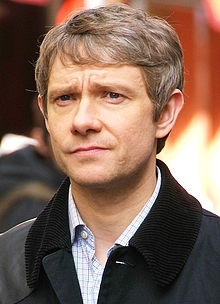As I have thoroughly established, I am a lifelong fan of British television. I grew up watching Masterpiece Mystery with my mom and now I have developed an intense - if one sided - love affair with the Doctor from the BBC's stunning sci-fi series, Doctor Who. Through the years, I have avidly consumed British media and for the last few years, Sherlock as become one of my all time favorites.
Sherlock, written by Stephen Moffat, features the thrilling actor Benedict Cumberbatch who embodies the character of Sherlock Holmes better than any of the varied and talented actors that came before him. The writing is crisp, the dialogue pithy, and the mysteries confounding. Sadly, as with most British television, the seasons (or series as they're known across the pond) are short. In Sherlock's case, very short. The show only has three episodes per season and it's been quite a while since the cliffhanger ending of season two.
Now that I've established my personal bias, let me turn to Elementary, an American production.
During the devastatingly long interim between Sherlock seasons (and it doesn't help that Doctor Who is also on hiatus), I've been searching around for something to fill the void. Though it may seem so, I certainly do not limit myself to British television. There are several American shows that I love: The Newsroom (and the West Wing. Basically anything written by Aaron Sorkin), Game of Thrones, Smash (I love a good musical), and Grey's Anatomy (yes, I know. Keep your teasing to yourself). So I am not in any way against American programming.
I heard from several people who like Elementary and the concept of Lucy Liu as Watson was intriguing so I decided to give it a try. After seven or eight episodes (because I badly wanted to like this show), I gave up. What was wrong with it? It wasn't a bad show per se. In fact, I would consider it above average for the American crime-solving genre. But because of the timing and the connection to Sherlock Holmes lore, Elementary faces the inevitable - and inevitably detrimental - comparison with the BBC's Sherlock.
Let's start with the basics.
The Casting:
As I've said previously, I think that Benedict Cumberbatch is the greatest actor to play the Character of Sherlock Holmes ever. This obviously puts - let me look up his name - Johnny Lee Miller at a disadvantage. I think it says a lot that when you look at IMDB's
Elementary page, Miller isn't even billed at the top. Which brings us to the companions. Drs John and Joan Watson. I like the risk that the American writers took casting Lucy Liu as the damaged and intensely loyal Dr. Watson. It's a great twist and I think she does a good job. I think she suffers much less by comparison with her counterpart, Martin Freeman. Once again, however, she comes to the table with a handicap because Martin Freeman, like Benedict Cumberbatch, is spot on casting and is easily the most memorable Dr. Watson of all time.
There's a reason why the fangirls are so obsessed with the Cumberbatch/Freeman pairing and it's not just their pretty eyes. They become the characters of Sherlock Holmes and John Watson so thoroughly that they cement themselves in your mental image. They are Holmes and Watson.
The Show:
Sherlock has three episodes at one and half hours a piece, which basically makes each episode a movie. Elementary, on the other hand, is limited to the approximately 45 minutes show of American prime-time. By nature of time-frame alone, Sherlock is able to delve much more deeply into each story, allowing the writer to craft an intricate and compelling mystery. Elementary, on the other hand, devolves into a typical and expected crime-solving show that happens to feature characters with the names Holmes and Watson. Oh, and Holmes is a recovering heroin-addict. Honestly that is about as much as the show has in common with the stories of Arthur Conan Doyle.
Which brings me to the main point. Casting aside - because although not nearly as good as the Cumberbatch/Freeman pairing, Miller and Liu aren't bad - the main problem with Elementary is that it's not smart. Elementary's Holmes doesn't blow me away with any cleaver deductions and the mysteries themselves are laughably predictable. The entire point of Sherlock Holmes is that he's a genius. Not only is a genius, he is THE genius. The smartest man that ever lived. A damaged yet compelling detective that solves crimes purely with the power of his amazing intellect.
There is just no comparison between the shows on an intellectual level. I STILL haven't figured how Sherlock escaped death in the last episode and I've watched it many times over. And that's the point. We need the writing to be, not only smart, but smarter than we are. We need a show that keeps us guessing. That keeps us on the edge of our seat and has enough clues and subtleties that we can watch the show over and over and still not catch everything.
This is a problem throughout American Television. The vast majority of shows lack any intellectual punch. They're dumbed down. If American television gave their writers the lee-way to write truly great shows, I have no doubt that they could do it. The problem is not that American producers aren't capable; it's that they don't give good writers the time and money needed to created a masterpiece like the BBC's Sherlock. I, for one, wish they would.
After all, smart is the new sexy.



.jpg)















